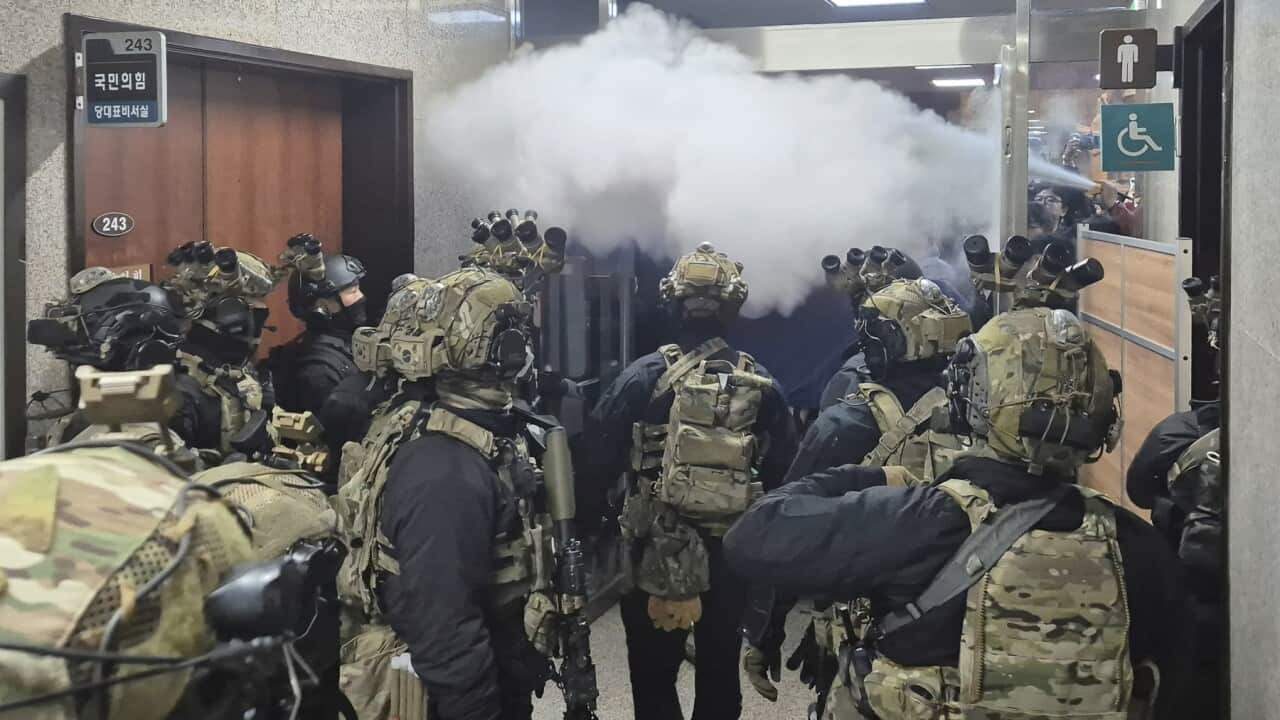TRANSCRIPT
Outside South Korea's parliament, protesters chant against the President.
Yoon Suk Yeol shocked much of the world by declaring martial law in South Korea for the first time in nearly 50 years.
President Yoon made the announcement on national TV at 11pm local time, catching many off guard.
"I was about to go to bed and watching news on YouTube. I thought this was a joke. Then it turned out true that he had declared a martial law. I got so worried."
Ditching their beds and evening viewing, hundreds of protesters quickly made their way to the parliament, heeding calls from the opposition.
"I believe I should step forward and take action as a citizen of the country. Things like this should never happen. It feels like we are returning to the era of dictatorship. I believe it is not right for the President to act unilaterally."
Scenes outside parliament became increasingly chaotic as troops and police were deployed.
Helicopters could be seen landing on the National Assembly's roof.
Live television footage showed troops attempting to enter the assembly building, while parliamentary aides tried to push back the soldiers by spraying fire extinguishers.
But within about two hours, South Korea's parliament, with 190 of its 300 members present, voted down the measure forcing President Yoon to return to the television screen.
"After the National Assembly's demand to lift martial law, martial law troops have been withdrawn. I will accept the National Assembly's demand and lift martial law through a cabinet meeting."
Opposition leader, Lee Jae Myung, confirming the end of an extremely short-lived period of martial law.
"The declaration of martial law was unconstitutional and void from the beginning, but this has been further confirmed by the recent resolution of the National Assembly. All presidential orders based on the declaration of martial law are unconstitutional, void, and illegal."
Martial law is the temporary rule by military authorities in a time of emergency, when civil authorities are deemed unable to function.
The last time it was declared in South Korea was in 1979, when the country's then long-term military dictator Park Chung-hee was assassinated during a coup.
It has never been invoked since the country became a parliamentary democracy in 1987.
Member of the opposition, Kim Byung Joo, has described the move as reckless.
"The Democratic Party has consistently pointed out that if impeachment became a reality Yoon would draw the sword of martial law. But no one could have imagined that it would be done in such a reckless and absurd manner. The Democratic Party will protect our people to the end. I ask that our citizens stand with the Democratic Party and help protect the Republic of Korea."
The opposition had moved to impeach cabinet members and several top prosecutors for failing to investigate the First Lady for accepting a Dior bag - one of several corruption scandals surrounding President Yoon.
In his initial address, Yoon said he was trying to save South Korea from what he calls anti-state forces, citing national security as a key reason for declaring martial law.
But analysts, including John Nilsson-Wright from Cambridge University, say the drastic move has more to do with a series of political setbacks.
"President Yoon seems to have made an announcement that suggests without any tangible evidence that the threat from North Korea, allied with opposition political forces, has required him to take this unprecedented action. I would interpret this as a response to his increasingly beleaguered domestic political position."
Yoon was voted into office in May 2022, but has been a lame duck president since April when the opposition won a landslide in the country's general election.
Since then, his government has not been able to pass bills and have been reduced instead to vetoing bills passed by the opposition.
This week, the opposition proposed slashing budgets for his government - and budget bills cannot be vetoed.
Associate Professor at the George Washington University's institute for Korean studies, Celeste Arrington, says Presient Yoon had become increasingly agitated.
"This is pretty shocking and seemed to be a somewhat extreme move. I think he is an inexperienced politician. He never held political office before and has shown signs over the last months of being increasingly frustrated with the political logjam that he faces domestically."
The move has caught South Korea's international allies off guard.
In a statement, a spokesperson for the Department of Foreign Affairs and Trade said the Australian government is closely monitoring the situation.
They also advised Australians in South Korea to follow the instructions of authorities and avoid public protests.
The U-S says it's also watching developments as some warn North Korea may take advantage of the political instability.
Department of Defense Press Secretary, Major General Patrick Ryder, reaffirming America's commitment to the trilateral relationship between South Korea, Japan and the U-S.
"First of all, our commitment to the alliance and the defense of the ROK is ironclad. We're going to continue to consult with ROK and see how things develop."
For now, calls for President Yoon to resign or face impeachment are only growing louder.













